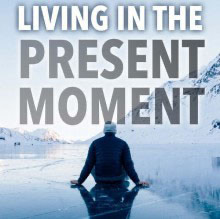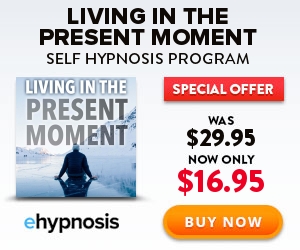
Whenever you read about the well-being or mental health, you'll likely see advice about living in the present moment.
Often, you'll see some discussion of being aware of your surroundings, along with a warning about focusing too much on the past or the future. However, perhaps you've found this idea difficult to grasp.
What, exactly, does it mean to live in the present moment? Alternatively, maybe the thought of it makes some intuitive sense to you, but you find it almost impossible to put into practice.
If these struggles sound familiar, you're not alone. In this article, we'll aim to demystify the idea of living in the present and help you understand what you need to do.
We'll start by explaining what being in the present actually means, and then we'll explain why living in the present is beneficial. Finally, we'll offer a couple of tips about mindful practices, and we'll look at how self-hypnosis can help you.
What Does It Mean To ‘Live In The Present Moment?’

It's helpful to contrast this way of being with two opposing ways of being - living in the past, and living in the future.
In the former case, your mind constantly replays old memories and you think about mistakes you've made, wondering what would have happened if you had acted differently.
In the latter case, you obsess about what might happen, often feeling anxious about negative possibilities.
When you live in the present, you stay in the moment - this moment. You become absorbed in life as it is happening, and your thoughts and feelings are tuned into this life experience.
This means everything is more vivid and enjoyably simpler. You fully appreciate the sights, sounds, smells, tastes, and feelings that the world offers you, and you don't judge yourself for the past or tie yourself in knots about the future.
Why Is Being Present So Difficult?

The main reason for this is that we are constantly surrounded by things that distract us.
Our phones, laptops, and televisions drown us in sounds and images, and the result can be a kind of disconnection from our lived experiences.
Another contributing factor is that many of us are raised with the notion that our worth is conditional.
So, if we're going to be good enough - valuable and loveable - then we need to try and control the future, and we're inclined to berate ourselves for the past.
Mindfulness For The Present Moment

Through daily mindfulness practice, you can begin to refocus your awareness, moving it away from the past and the future. This builds a kind of situational awareness that begins to be your default setting.
For example, breathing meditations urge you to focus on nothing but the feeling of air entering and exiting your body.
Meanwhile, body scanning mindfulness exercises prompt you to notice feelings and sensations all over your body. You can also practice mindfulness just by observing the sea, or watching the patterns in the clouds.
The goal of all such exercises is the same - to keep your mind living in the moment and to simplify your thinking.
It's common to suffer from intrusive thoughts at first, but if you let go of these thoughts without negative judgment then they'll steadily become less frequent.
The Benefits Of Living In The Moment
So, why is it so important to live in the moment? The main reason is that learning how to be present promotes happiness and success.
You reduce the amount of stress and worry in your life. Here are four further changes that come from living in the moment, and what you can expect from each.
Balance the Past
Living in the moment encourages you to think only about the past in small doses. In particular, you dwell on past experiences only if they're directly relevant to the present.
For example, instead of ruminating on the end of an old relationship, you might think of it only when you can learn something that's useful to make a new relationship go well.
The benefits of this are clear - you don't waste time and energy on feeling bad about things you can't change. However, neither do you hide from the past, as you still use it as an active resource to help improve your present.
Stay Present

There are numerous proven benefits of mindfulness, and it turns out that staying present can actually change the structure of your brain.
In particular, the areas associated with emotional regulation and perspective-taking improve.
This means you're better able to empathize with others, which helps you build solid relationships.
Meanwhile, the improvement in emotional regulation leaves you better equipped to handle stress.
Remember, too, that if you're struggling then you can incorporate mindfulness any time of day simply by focusing on your breathing for a few minutes.
Balance The Future
As noted above, living in the present helps us make the best use of the past. However, it also encourages us to do something similar in the future.
You begin to only think of the future in small doses, typically when it's necessary for making plans right now. The main benefit of this is a reduction in anxiety about the future.
You think about it only when there's something important that you can change or affect, rather than worrying about aspects of the future that are entirely out of your hands. This is just another way in which living in the present seems to simplify life.
Discovery Of Opportunities

In contrast, when you're fully inhabiting the present moment, you're more likely to pick up on life's opportunities.
This is sometimes as straightforward as noticing an advert or an invitation or spotting a chance to connect with someone.
In addition, the time freed up by living in the present means you have more resources available to make new opportunities for yourself.
While you can use some of these for career development or relationship maintenance.
It's also worth dedicating some of this new time to personal growth.
Journalling

You can explore thoughts, feelings, and sensations you're having at the moment, and try to better understand their meaning.
Unedited, stream of consciousness journaling can give you surprising and useful insights into the subconscious.
Meanwhile, gratitude journaling is a specific subset of journal work, which focuses on logging the things that spark appreciation in you.
You can try adding an entry every day, including 3-5 things that you feel grateful for in that moment.
This primes your mind to notice more reasons for gratitude as you go about your everyday life.
Connecting With Nature

Every chance you get, go for a walk, and challenge yourself to really be aware of your surroundings. When you're mindful, nature is even more breathtaking than usual, giving you fresh reasons to appreciate the world.
Time in nature can help you be mindful if you're struggling to practice mindfulness sitting in the house.
You don't need to go anywhere exotic to get any of these benefits - even a walk around your neighborhood can be beautiful when you're looking at it in a new light.
Try Self-Hypnosis For Living In The Present Moment

Self-hypnosis is a quick, effective way to encourage yourself to live in the present. By relaxing your mind and making suggestions that support mindful thinking, self-hypnosis can help you overcome barriers and defenses that may be holding you back.
This can be a particularly useful tool if you struggle to let go of the past or suffer from anxiety about the future.
Through self-hypnosis, you can also learn tricks and techniques that you can apply any time you find mindfulness more difficult than usual.
It can't make you do anything you don't want to, but it can help you move past mental blocks that stop you from being your best self.
So, try our Living in the Present Self Hypnosis Program today if you want to live a calmer, simpler life where you truly appreciate every moment.


